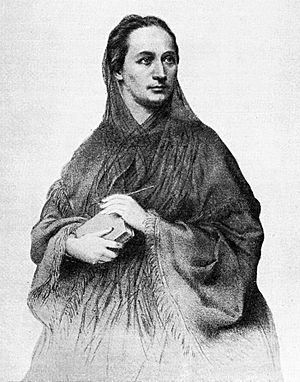Božena Němcová facts for kids
Quick facts for kids
Božena Němcová
|
|
|---|---|

Božena Němcová - engraving by Jan Vilímek
|
|
| Born | Barbora Novotná 4 February 1820 ? Vienna, Austrian Empire |
| Died | 21 January 1862 (aged 41) Prague, Austrian Empire |
| Resting place | Vyšehrad Cemetery |
| Occupation | Writer |
| Nationality | Czech |
| Literary movement | Czech National Revival |
| Notable works |
|
| Spouse |
Josef Němec
(m. 1837) |
| Children |
|
| Signature | |
 |
|
Božena Němcová (born February 4, 1820, in Vienna – died January 21, 1862, in Prague) was a very important Czech writer. She was part of the final stage of the Czech National Revival movement. This movement was a time when Czech people worked to bring back their language, culture, and national pride.
Her picture is shown on the 500 CZK banknote in the Czech Republic. This shows how important she is to the country.
Contents
Who was Božena Němcová?
Božena Němcová was born in 1820. Her birth name was Barbara Pankel, or Barbora Panklová in Czech. She was born in Vienna. Her father, Johann Pankel, was from Lower Austria. Her mother, Teresie Novotná, was a maid from Bohemia.
Her Childhood and Family Life
When she was a child, Božena lived near a small town called Ratibořice. Her grandmother, Magdalena Novotná, was a very special person in her life. Božena Němcová later wrote her most famous book, Babička, about a main character inspired by her own grandmother.
When Božena was 17, she married Josef Němec. He was fifteen years older than her and worked as a customs officer. Her parents arranged the marriage. However, it was not a happy marriage because they did not understand each other well. Josef Němec was known to be a strict man. He was also a Bohemian patriot, which means he loved his country. This caused problems with his bosses. He was often moved to different places and later lost his job.
Challenges and Legacy
Božena and Josef had four children. They often struggled with money. Božena Němcová died in poverty, and she was separated from her husband at the end of her life. Even though she faced many difficulties, she continued to write.
Czech patriots, who admired her work and her love for her country, arranged a grand funeral for her. She is remembered as one of the most important figures in Czech literature. Her stories helped to shape the Czech national identity.
See also
 In Spanish: Božena Němcová para niños
In Spanish: Božena Němcová para niños
Images for kids
 | Sharif Bey |
 | Hale Woodruff |
 | Richmond Barthé |
 | Purvis Young |


